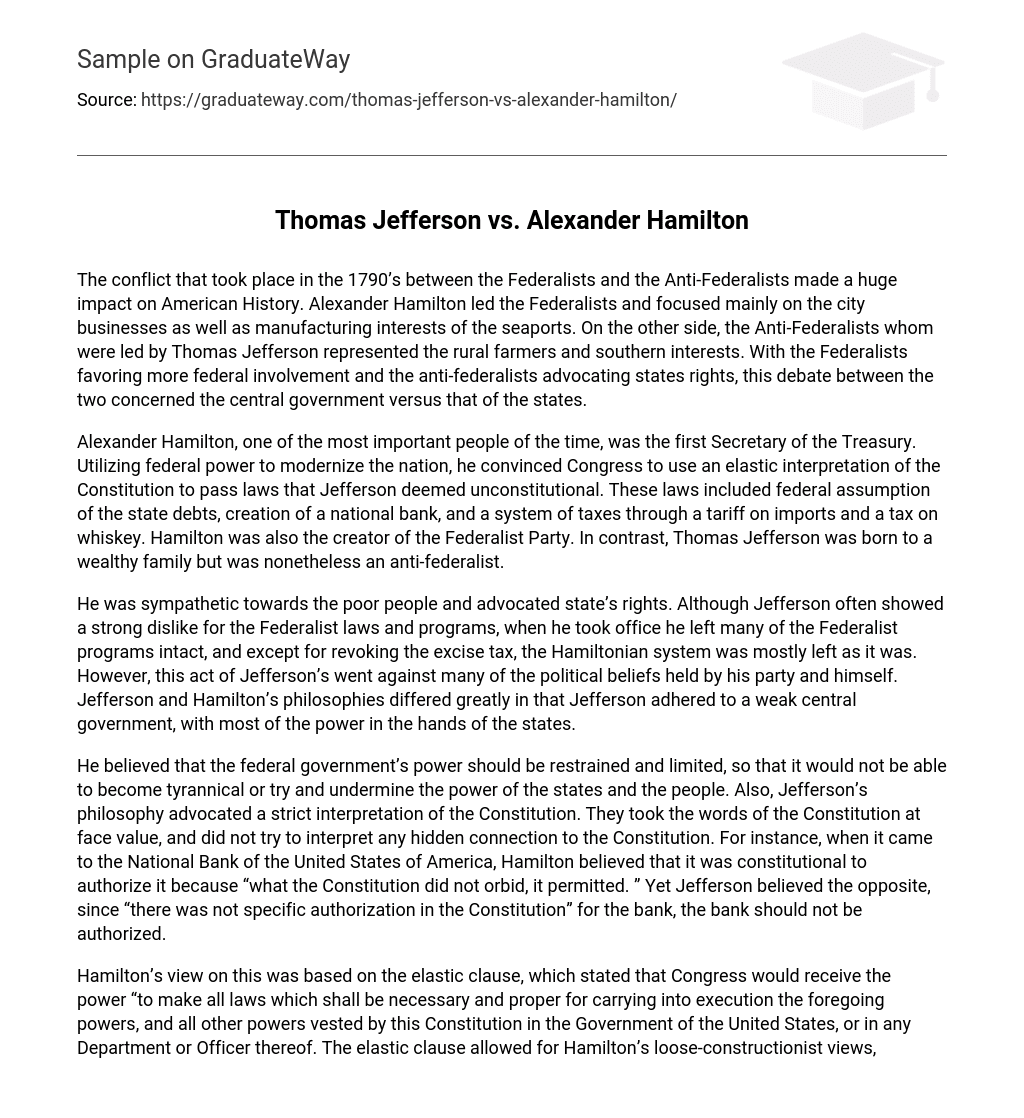The conflict between the Federalists and the Anti-Federalists in the 1790’s had a significant impact on American History. The Federalists, led by Alexander Hamilton, focused on urban businesses and manufacturing interests of seaports. Conversely, the Anti-Federalists, spearheaded by Thomas Jefferson, represented rural farmers and southern regions. The Federalists supported increased federal involvement whereas the Anti-Federalists championed states’ rights. This debate revolved around the power of the central government versus that of individual states.
Alexander Hamilton, the first Secretary of the Treasury, was a highly influential figure who successfully persuaded Congress to adopt an elastic interpretation of the Constitution. This enabled the passage of laws considered unconstitutional by Thomas Jefferson, including federal assumption of state debts, establishment of a national bank, and implementation of taxes via import tariffs and a whiskey tax. In addition to his role in founding the Federalist Party, Hamilton’s influence extended to shaping anti-federalist beliefs held by Thomas Jefferson.
He was sympathetic towards the poor people and advocated for state’s rights. Despite often expressing a strong dislike for Federalist laws and programs, Jefferson decided to maintain many of these programs when he took office. The only exception was the revocation of the excise tax, as the Hamiltonian system remained mostly unchanged. This action by Jefferson contradicted the political beliefs of both his party and himself. The philosophies of Jefferson and Hamilton differed greatly, with Jefferson favoring a weak central government and a majority of power held by the states.
Jefferson argued for limited federal government power to prevent tyranny and the undermining of state and individual power. He also advocated for a strict interpretation of the Constitution, taking its words at face value without seeking hidden meanings. This differed from Hamilton’s belief that if the Constitution did not prohibit something, it was permitted. One specific example of their disagreement was the National Bank of the United States, which Hamilton believed was constitutional because it was not explicitly prohibited, while Jefferson argued that since there was no specific authorization in the Constitution, the bank should not be permitted.
Hamilton argued in favor of a loose interpretation of the elastic clause, which grants Congress the power to create laws necessary for executing the powers mentioned in the Constitution, as well as any other powers vested in the government or its departments and officers. This flexible interpretation allowed the judiciary to determine not only the legality of these laws but also their purpose. In contrast, Jefferson took a strict constructionist approach, allowing only for interpretation based on the letter of the law. However, Hamilton’s philosophy supported a strong central government capable of suppressing democratic movements such as Shay’s Rebellion. Additionally, Hamilton’s ideas favored the wealthy and aimed to safeguard their financial interests.
There was significant support for the Federalists among the wealthier classes, particularly the merchants on the seaboard. Conversely, Jefferson’s policies appealed to farmers and the poor, gaining support in more impoverished areas such as the west. Political and economic tensions arose between Jefferson and Hamilton, as their differing political beliefs influenced their views on the economy.
Hamilton advocated for an assertive strategy in addressing the financial responsibilities of the United States. He advocated for the federal government to assume all the debts of the states and to fully fund the national debt at its original value. This decision resulted in a significant debt of 75 million dollars for the government, as Hamilton believed it would enhance the country’s credit.
Hamilton persuaded Congress to approve an excise tax on particular domestic items, notably whiskey, as a means of generating the required finances. Nevertheless, Jefferson was infuriated by this choice, perceiving it as an infringement on Federal government authority. Although Hamilton, a supporter of a robust central government, had no objection to his actions, Jefferson grew highly anxious that his forceful economic measures were eroding state power.
Hamilton’s economic policy leaned towards the wealthy, a contrast to Jefferson’s concern for the less fortunate, particularly the farmers. Jefferson saw farming as a noble profession that kept individuals out of urban areas, exposed them to sunlight, and fostered a connection to spirituality. Additionally, Jefferson believed that agriculture could sustain a nation during times of war, ensuring a secure supply line and protecting the United States from vulnerability.
Despite both Hamilton and Jefferson attempting to provide the country with their respective visions of what they believed to be in its best interest, it became clear that their perspectives were in conflict. The sharp contrast in their political and economic ideologies led to frequent disagreements between Hamilton and Jefferson. The Federalism supported by Hamilton and the anti-federalism advocated by Jefferson generated divergent movements that impacted the nation economically and politically in the post-Revolution years.





